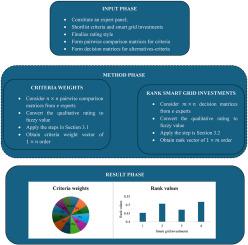通过模糊多标准方法评估智能电网投资驱动因素并制定有效政策
IF 16.3
1区 工程技术
Q1 ENERGY & FUELS
引用次数: 0
摘要
确定哪些因素会影响更多的智能电网投资以及哪些智能电网投资政策更适合可再生能源项目至关重要。然而,关注这一主题的研究数量有限,这意味着需要一项新的研究来填补这一空白,并帮助在模棱两可的情况下做出决策。因此,本研究提出了一个新颖的模糊群体决策框架。通过模糊加权决策试验和评估实验室(F-DEMATEL-W)方法对 12 个驱动因素进行了研究。随后,使用模糊加权汇总产品评估(F-WASPAS)对四种智能电网投资政策进行排序。因此,本研究的新颖之处在于提出了一种名为 F-DEMATEL-W-WASPAS 的稳健决策工具。其他新颖之处还有(i) 通过考虑配对交互作用和专家权重,有条不紊地确定指标/标准的重要性;(ii) 确定专家驱动的个体化权重向量和指标累积权重向量;(iii) 以最小决策参数对备选政策进行排序;(iv) 确定对智能电网投资有效性至关重要的驱动因素及其因果关系;(v) 对智能电网投资政策进行可靠排序。研究结果表明,网络安全、充分的法律程序和财务可行性是提高智能电网投资有效性的首要驱动因素。此外,利用财政激励措施鼓励可持续能源生产是最重要的政策,其次是为系统所有者交换剩余电力。这项工作可能有助于目前关于为可再生能源项目设计智能电网投资政策的讨论。本文章由计算机程序翻译,如有差异,请以英文原文为准。

Evaluating smart grid investment drivers and creating effective policies via a fuzzy multi-criteria approach
It is critical to determine which factors impact more smart grid investments and which smart grid investment policy is more suitable for renewable energy projects. Nonetheless, a limited amount of research has focused on this topic, meaning a new study is needed to fill this gap and aid in making decisions under ambiguities. Thus, this research proposes a novel fuzzy group decision-making framework. Twelve drivers are examined through the fuzzy weighted decision-making trial and evaluation laboratory (F–DEMATEL–W) methodology. Subsequently, four smart grid investment policies are ranked using fuzzy weighted aggregated sum product assessment (F–WASPAS). Hence, one of the novelties of this research is the proposal of a robust decision-making tool named F–DEMATEL–W–WASPAS. Other novelties are: (i) the importance of the indicators/criteria is methodically determined by considering pairwise interactions and weights of experts; (ii) both individualistic expert-driven weight vector and cumulative weight vector of indicators are determined; (iii) alternative policies are ranked with minimum decision parameters; (iv) drivers that are crucial for the effectiveness of smart grid investment are determined with their causal relationship, and (v) smart grid investment policies are ranked reliably. The findings demonstrate that cyber security, sufficient legal procedures, and financial viability are the foremost drivers to increase the effectiveness of smart grid investments. Moreover, encouraging sustainable energy production using financial incentives is the foremost policy, followed by exchanging surplus electricity for the system owners. The work may contribute to the ongoing discussion on designing smart grid investment policies for renewable energy projects.
求助全文
通过发布文献求助,成功后即可免费获取论文全文。
去求助
来源期刊

Renewable and Sustainable Energy Reviews
工程技术-能源与燃料
CiteScore
31.20
自引率
5.70%
发文量
1055
审稿时长
62 days
期刊介绍:
The mission of Renewable and Sustainable Energy Reviews is to disseminate the most compelling and pertinent critical insights in renewable and sustainable energy, fostering collaboration among the research community, private sector, and policy and decision makers. The journal aims to exchange challenges, solutions, innovative concepts, and technologies, contributing to sustainable development, the transition to a low-carbon future, and the attainment of emissions targets outlined by the United Nations Framework Convention on Climate Change.
Renewable and Sustainable Energy Reviews publishes a diverse range of content, including review papers, original research, case studies, and analyses of new technologies, all featuring a substantial review component such as critique, comparison, or analysis. Introducing a distinctive paper type, Expert Insights, the journal presents commissioned mini-reviews authored by field leaders, addressing topics of significant interest. Case studies undergo consideration only if they showcase the work's applicability to other regions or contribute valuable insights to the broader field of renewable and sustainable energy. Notably, a bibliographic or literature review lacking critical analysis is deemed unsuitable for publication.
 求助内容:
求助内容: 应助结果提醒方式:
应助结果提醒方式:


